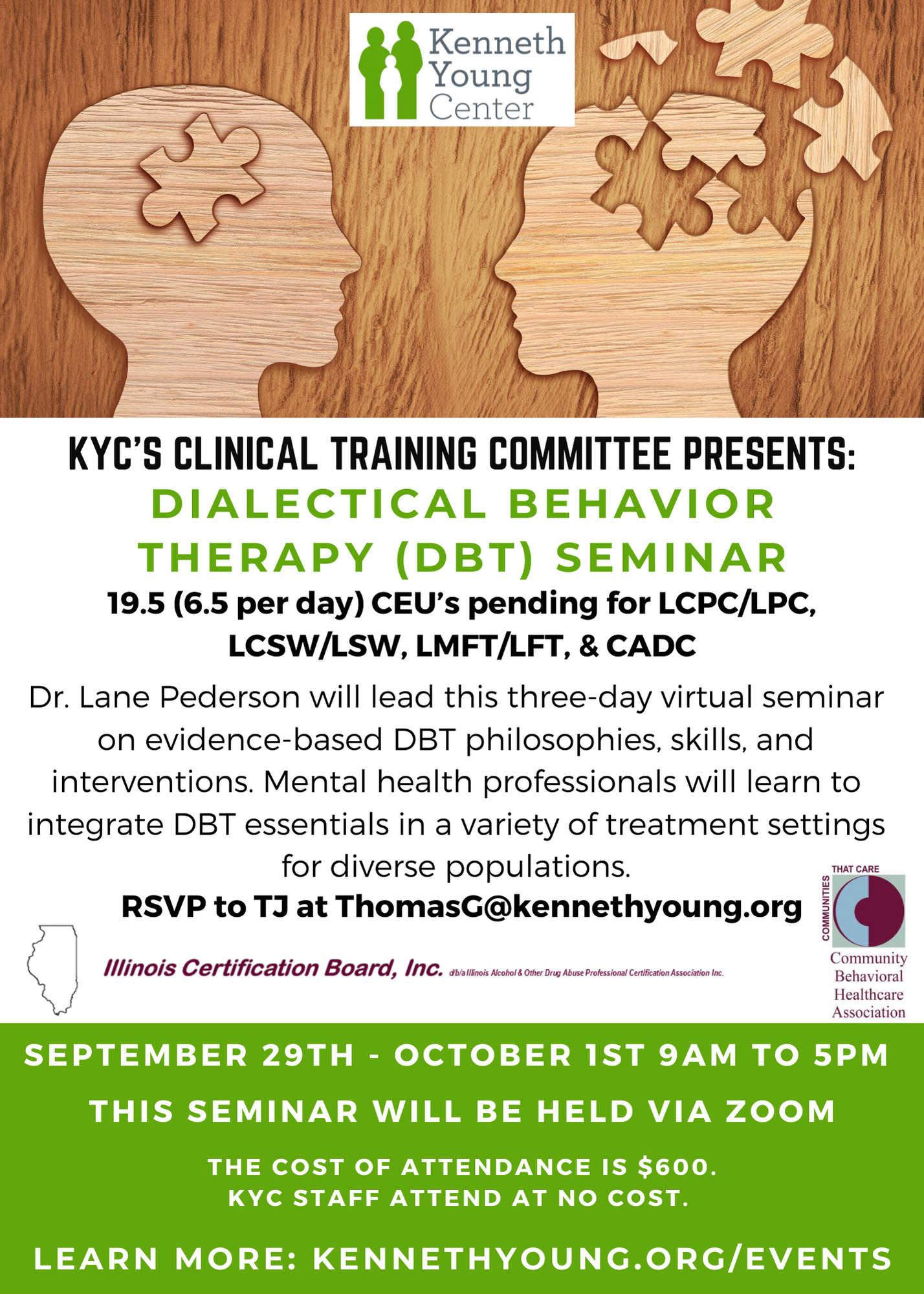
Wednesday, September 29, 2021
Dialectical Behavioral Therapy (DBT) Seminar
Mental Health Professionals, join KYC’s Clinical Training Committee for a three-day virtual seminar on Dialectical Behavior Therapy (DBT).
Dr. Lane Pederson will lead three days of Dialectical Behavior Therapy (DBT) training for mental health professionals. The entirety of the training will be grounded in evidence-based practices, a focus on clinical outcomes, and an emphasis on therapeutic factors. Therapists who attend this training will learn DBT philosophies, skills, and interventions. Consultation specific to the implementation of DBT will also be provided during the course of the training. Follow-up consultation is available on a per hour basis.
Dialectical Behavior Therapy (DBT) has evolved from the go-to treatment for borderline personality disorder to one of the most recognized and sought after therapies for a variety of difficult to treat client problems. With an expanding evidence base, DBT skills and strategies are must-have for all types of therapists.
This training covers DBT from theory to application with up-to-date research, accessible teaching, video examples, and experiential exercises that emphasize evidence-based practices and therapeutic factors. Therapists of all levels will learn DBT essentials to integrate into their own practice, to confidently practice from a DBT orientation, and to continue their own personal development as a DBT therapist. Additionally, therapists will learn how to apply DBT in different treatment settings with diverse populations.
Event Information
19.5 (6.5 per day) CEU’s pending for LCPC/LPC, LCSW/LSW, LMFT/LFT, & CADC
Dates: September 29th, September 30th, and October 1st
Time: 9:00 AM to 5:00 PM
Location: Virtual, hosted by Kenneth Young Center. Meeting information will be sent to registered participants.
RSVP: Mental Health Professionals and KYC staff are welcome to join. The cost to attend is TBA. KYC Staff can attend at no cost. Please contact TJ to RSVP or with questions. Please include your licensure in your RSVP email for efficient processing of your CEU credits, as well as your preferred email address to receive the Zoom link to the training session.
Cost: $600 (KYC staff can attend at no cost)
Learning Objectives
- Apply outcome-based DBT consistent with evidence-based practices
- Connect DBT philosophies and interventions to the therapeutic factors that most improve outcomes
- Learn dialectic philosophies and their application in therapy
- Put the core assumptions of DBT into action
- Explain how DBT theory drives interventions
- Develop the fluid movement between validation and change strategies
- Integrate mindfulness into therapy (and your own life)
- Implement an effective therapy structure that includes identifying clear treatment targets
- Effectively integrate skills training into therapy
- Identify teaching strategies for skills training sessions
- Effectively teach the 4 standard DBT skills modules
- Learn and teach supplemental DBT skills
- Understand DBT from cognitive-behavioral, client-centered, and other approaches
- Practice a multi-layered approach to validation
- Balance validation with the most effective (and practical) methods of behavior change
- Learn and practice the key differences between traditional cognitive interventions and DBT-style cognitive interventions
- Determine when to use (and not to use) exposure techniques
- Master DBT diary cards and behavioral (chain) analysis
- Effectively participate with consultative groups and treatment teams
- Assess and manage self-injurious and suicidal behaviors with clear protocols and safety plans
- Establish a plan for your further development as a DBT therapist
- Provide proper informed consent to treatment and research
- Identify and address ethical issues in the treatment of adolescents
- Identify and address boundary and liability issues in consultation and supervision
- Identify and address ethical concerns related to the assessment and intervention of safety issues
Program Outline
Developing the Foundation
Essentials of DBT
- Explicit focus on validation
- Cognitive-behavioral change strategies
- Dialectical balance
- Skills training
- Mindfulness
- Consultative Approach
DBT and the Contextual Model
- Understanding how therapy works
- Six decades of empirical research
- Evidence-based practice
- Maximizing therapeutic factors, DBT-style
Dialectics in Practice
- Dialectics explained
- Dialectic assumptions
- Dialectics in action
Core Assumptions of DBT
- Acceptance and nonjudgmental stance
- View of clients, therapists, and therapy
- What’s needed in a DBT clinical process
Biosocial Model
- Biosocial theory of difficulties
- How theory drives therapy
Mindfulness and DBT
- Mindfulness explained
- Mindfulness of the approach
- Mindfulness as a therapy technique
- Mindfulness in life
Getting Started: Structuring Therapy
- Structure as a therapeutic factor
- Structuring the therapy environment
- Identifying treatment targets: suicidality, self-injurious behavior (SIB), therapy-interfering behavior (TIB), and other targets
Making It Practical: How Will Your Therapy or Program Be Structured?
Skills Training
- Integrating Skills into Therapy
- Using skills to develop new behaviors
Mindfulness: The Path to Wise Mind
- What Skills: Observe, Describe, Participate
- How Skills: Nonjudgmental, One-mindful, Effectively
- Mindfulness Practice and Application
Teaching Dialectics
- Identify dialectical dilemmas
- Activate Wise Mind action
Distress Tolerance
- Wise Mind ACCEPTS
- IMPROVE the Moment
- Pros and Cons
- Radical Acceptance/Turning the Mind
Emotion Regulation
- Model of Emotions
- PLEASED
- Build Positive Experiences
- Opposite Action
Interpersonal Effectiveness
- FAST skills
- GIVE skills
- DEAR MAN skills
Supplemental DBT Skills and Modules
DBT Therapy
Validation
- Multi-layered approach to validation
- Validation as an exposure technique
- Balance of validation and change
Change Interventions
- Behavioral principals
- Contingency procedures
- Best behavior change methods
- DBT-style cognitive interventions
Communication Styles
- Reciprocal
- Irreverent
Diary Cards: Standard and Adapted
Behavior Chain (Change) Analysis
- Getting the client on board
- Build awareness and options
Consultative Group and Treatment Teams
- Increase your motivation
- Develop effective responses
- Qualities of effective treatment teams
Next Steps
- What you learned and what you need
- Developing your plan
- Taking action
About the Speaker
Dr. Pederson has provided DBT training and consultation to over 20,000 professionals in the United States, Australia, South Africa, Canada, Mexico, and the Middle East through his training and consultation company, Lane Pederson and Associates, LLC (www.DrLanePederson.com). Notable organizations he has trained for include Walter Reed National Military Hospital, the Federal Bureau of Prisons, the US Navy, the Canadian Department of Defense, the Ontario Psychological Association, and Psychotherapy Networker. He has provided DBT training for community mental health agencies, chemical dependency treatment centers, hospital and residential care settings, and to therapists in forensic settings.
Dr. Pederson’s DBT publications include the award-winning The Expanded Dialectical Behavior Therapy Skills Training Manual, Second Edition (PESI, 2019); Dialectical Behavior Therapy: A Contemporary Guide for Practitioners (Wiley, 2015); and Dialectical Behavior Therapy Skills Training in Integrated Dual Disorder Treatment Settings (PESI, 2013). He is also the author of the best-selling DBT Deck for Therapists and Clients.
A real world practitioner, Dr. Pederson co-owns Mental Health Systems, PC (MHS), one of the largest DBT-specialized practices in the United States with four clinic locations in Minnesota (www.mhs-dbt.com). At MHS Dr. Pederson has developed DBT programs for adolescents, adults, people with dual disorders, and people with developmental disabilities. He has served as clinical and training directors, has directed practice-based clinical outcome studies, and has overseen the care of thousands of clients in need of intensive outpatient services.
Dr. Pederson currently serves on the advisory board for the doctorial counseling program at Saint Mary’s University of Minnesota and is a peer reviewer for Forensic Scholars Today.

Click here to view the flyer.

